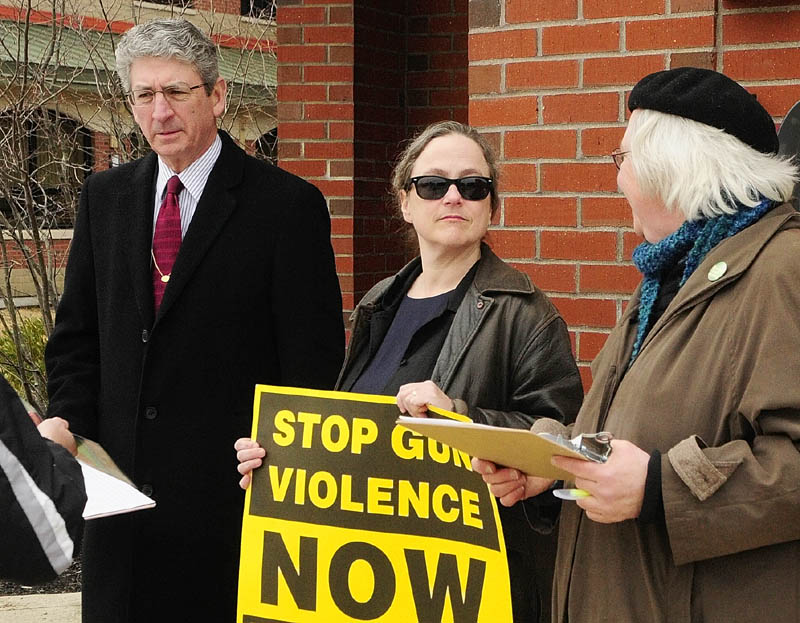AUGUSTA — Congressional action is needed to combat illegal gun trafficking that is outside the jurisdiction of state prosecutors, Mayor William Stokes said Thursday.
Stokes, also the state’s deputy attorney general, and Hallowell Mayor Charlotte Warren gathered signatures Thursday morning in support of gun control measures, including a law to make gun trafficking a federal crime.
Warren and Stokes are members of Mayors Against Illegal Guns, a gun control advocacy group launched by New York City Mayor Michael Bloomberg. The group organized the National Day to Demand Action, with more than 100 events across the country planned for Thursday, including some at the University of Maine at Augusta and in Portland.
Volunteers gathered 62 petition signatures at UMA on Thursday and 65 at a midday gathering in Portland that featured Mayor Michael Brennan and former Lewiston Mayor Larry Gilbert.
The petition calls for three reforms to gun laws: requiring a criminal background check for all gun sales, banning military-style assault weapons and high-capacity ammunition magazines, and making gun trafficking a federal crime with stiff penalties.
Warren said she is a gun owner and hunts with relatives, but she thinks protections for gun ownership have gone too far.
“We have been bullied by the gun lobbyists for long enough, and the citizens of America support common-sense gun reform,” she said. “I’m here today to do my part to send a message to Congress and to say, ‘It’s time to act. You have the support of Americans.'”
One of the particular targets of Mayors Against Illegal Guns is U.S. Sen. Susan Collins, R-Maine, who has one of the lowest National Rifle Association ratings among Republicans and has co-sponsored a bill to make gun trafficking a federal felony.
In Maine, if a person buys a gun for someone known to be prohibited from possessing one, the seller could be charged with conspiracy or as an accomplice to possession of a firearm by a prohibited person, Stokes said — that is, as long as everything happens in Maine.
In many cases, however, guns bought by “straw purchasers” for people who can’t buy their own are moved across state lines.
“The federal government really is uniquely positioned to handle out-of-state trafficking,” said Stokes, who heads the attorney general’s criminal division. “The states can’t do that; we don’t have the resources or, frankly, the out-of-state jurisdiction to go into another state and prosecute gun trafficking. What this would do is make it a federal crime.”
Warren and Stokes said there’s no practical need for ammunition magazines that can hold 30 rounds and that background checks need to be required for all gun sales, including those at gun shows or taking place between private people.
Stokes noted that supporters of gun rights often use the argument that “guns don’t kill, people do.”
“Well, OK, if you accept that argument, you have to take some action to find out who is it you’re selling a gun to,” Stokes said. “And the only way you can do that is a background check.”
One of the volunteers at UMA on Thursday was Kim Fleming, a Belfast resident who grew up in Newtown, Conn., and had a high school classmate whose daughter was killed at Sandy Hook Elementary School.
Although gun control legislation faces steep challenges in Congress, Fleming said the momentum for change that emerged from the Sandy Hook massacre remains.
“It’s something that I think people don’t want to talk about because it’s so disturbing,” she said, “but I think we need to understand the horrific day that occurred that day and why it occurred. … That’s why today is so important, to make sure that we are still talking about it.”
Susan McMillan — 621-5645
smcmillan@mainetoday.com
Send questions/comments to the editors.



Comments are no longer available on this story